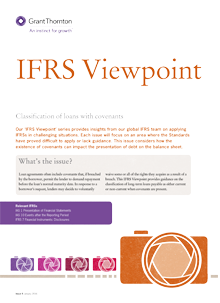Loan agreements often include covenants that, if breached by the borrower, permit the lender to demand repayment before the loan’s normal maturity date. In response to a borrower’s request, lenders may decide to voluntarily waive some or all of the rights they acquire as a result of a breach. This IFRS Viewpoint provides guidance on how the presence of covenants, breaches and waivers can impact the classification of long-term loans payable as either current or non-current.
The classification of a long-term loan payable as a current or non-current liability is based on a snapshot of the existing rights of the borrower and lender at the reporting date:
- when a borrower has the right to defer settlement for at least 12 months beyond the reporting date, a loan is classified as non-current
- the anticipated outcome of future covenant tests (based on financial conditions existing after the end of the current reporting period) does not influence the classification of a loan at the reporting date
- when assessing the impact of waivers, it is important to consider both the timing of the waiver and how it affects the rights of the parties at the reporting date. Waivers received after the reporting date are ignored when assessing a loan's classification at the reporting date
- whether or not a breach has ben reported to the lender is irrelevant.
Our Viewpoint explores these issues in more detail and works through a number of practical examples. We also explore what happens when a lender issues a waiver, but in exchange requires the borrower to agree to an additional covenant assessment falling within the next 12 months. In each case we assume that a breach of a borrowing covenant entitles the lender to require repayment on demand.
Read full report


